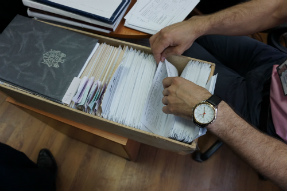Working together to improve the efficiency of justice
On 1-3 June 2015, a team of experts from the European Commission for the Efficiency of Justice (CEPEJ) carried out an inception and fact-finding visit of the European Union/Council of Europe Joint Project 'Strengthening the efficiency of justice and support to lawyers’ profession in the Republic of Moldova'.
 |
 |
 |
The main goal of this visit was to introduce the project and the work of CEPEJ to the national partners – the main justice sector stakeholders such as the Superior Council of Magistracy, the Ministry of Justice, the Department of Judicial Administration, the National Institute of Justice and 6 pilot courts, including the Supreme Court of Justice of the Republic of Moldova. At the end of this two-year project it is expected that the lessons learned from implementation of the CEPEJ tools in six pilot courts will provide “food for thought” to the judicial administration and policy makers, in view of disseminating and implementing the good practices at the national level. Additionally, the efficiency and quality of justice will take their due place among the objectives of all courts and every single judge and will be introduced to these objectives in the training curricula of the National Institute of Justice. As a result, the citizens of Moldova will experience an improved functioning of the pilot courts and, in the long run, a better access to justice and quality of judicial services countrywide
On 1 June 2015 a specially designed workshop on improving the efficiency and quality of justice in the Republic of Moldova through the implementation of CEPEJ tools was held. The workshop’s objective was met: it served as the project’s general meeting and launching event and was focused primarily on the familiarisation of the participants with the SATURN Guidelines for judicial time management, the Checklist for promoting the quality of justice and the courts and the Handbook for conducting satisfaction surveys aimed at Court users.
 |
 |
 |
A further objective of the visit was the development of a court coaching programme based on the above-mentioned CEPEJ tools, directed at improving the efficiency and quality of six pilot courts from the Republic of Moldova in 2015-2016.
The comments and discussion during the workshop and the visits to three of the pilot courts (Supreme Court of Justice, Chisinau Appellate Court and Riscani Sector Court of Chisinau Municipality) gave the CEPEJ experts the opportunity to explore the specific needs of the Moldovan judicial system and, in particular, the needs of the pilot courts with a view to improving the judicial time management and the quality of justice as a public service.
 |
 |
 |
The next steps under the project will be the preparation of the report which will contain the key topics discussed with the pilot courts and other members of the judiciary, as well as with other justice sector stakeholders during the visit, the particularity of the CEPEJ tools and it will outline the main features of the court coaching programme for the six pilot courts.
The findings of this first visit facilitated the planning of the project’s next phases, in particular:
- definition of the information to be collected and analysed by the pilot courts for the purpose of a self-assessment on implementation of the SATURN Guidelines for judicial time management and the CEPEJ Checklist for promoting the quality of justice and the courts;
- analysis by the CEPEJ experts of the information provided by the pilot courts, fine-tuning the diagnosis of the specific needs and organisation of a follow-up discussion in September 2015 on the self-assessment exercise;
- planning of the implementation of measures recommended by the CEPEJ experts in view of increasing the efficiency and quality of services in the pilot courts for the remaining months of 2015 and 2016.
The CEPEJ delegation was composed of the following CEPEJ members and experts:
Mr Ivan Crnčec, Assistant Minister for the European Union and International Co-operation, Directorate for European Affairs, International and Judicial Cooperation of the Ministry of Justice (Croatia),
Mr Frans van der Doelen, Programme Manager of the Department of the Justice System, Ministry of Security and Justice (the Netherlands);
Mr Fotis Karayannopoulos, Lawyer, D.E.A. European Law (Greece);
The experts were supported by Mr Leonid Antohi, project coordinator from the CEPEJ Secretariat and Mr Ruslan Grebencea, project officer.


